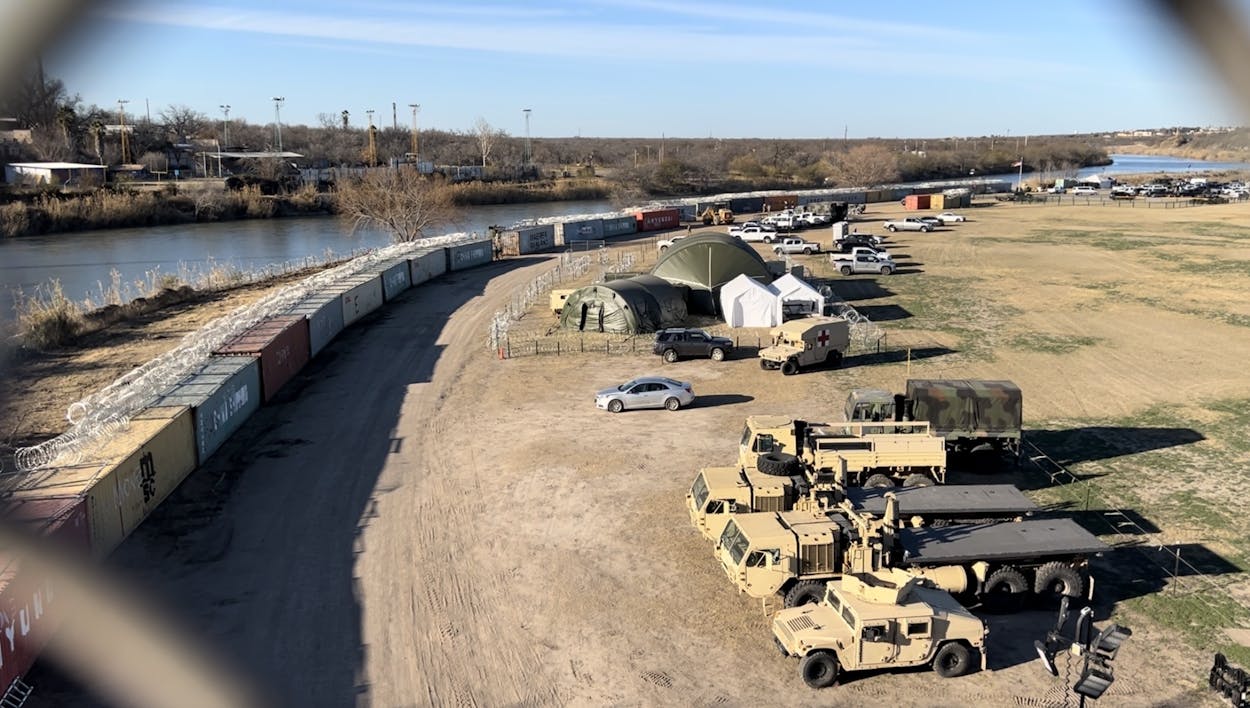If you happen to be looking for a place to stay the night in Eagle Pass, you’d be hard-pressed to find any available rooms within the city limits. The Holiday Inn Express is overrun with Florida troopers. The Hampton Inn has Texas National Guard forces and news crews out the wazoo. The hotels and motels have hiked their prices in the face of high demand: the Comfort Inn & Suites, a two-star establishment located downtown, recently posted rates starting at $400 a night for the weekend—more costly than some big-city luxury hotels (at the time of publication, the inn was completely sold out).
The border town of about 28,000 used to be the sort of place most folks had seldom heard of. If they had, it was probably because of the Kickapoo Lucky Eagle Casino, located on a reservation some ten miles south of town—one of three casinos in the state. But over the past year and a half, Eagle Pass has unwittingly become a focal point of what passes for our national debate on immigration—first because of a massive migrant caravan, and now as the site of a supposed standoff between the federal government and Lone Star State over control of the border, with Republican officials in Texas and elsewhere inciting rumblings of civil war. Nowadays, if you mention Eagle Pass to outsiders, they say, “Oh, y’all have all the immigrants, and y’all have the border buoys,” Humberto O. Garza, the public information officer for the Eagle Pass Police Department, told me. “I’m like, ‘Don’t remind me.’ ”
But the reminders are constant. Armed men dressed in camo patronize Sweet Tweets, a popular cafe that’s walking distance from the international port of entry. Residents appear unfazed when you tell them you’re a journalist. “We’ve just been bombarded,” Garza said. “Usually we deal with four media sources”—two from Mexico and two local publications. “And now it’s CNN, ABC, CBS.” He added, “We’re in the news for all the wrong reasons.”
On an afternoon in late January, a handful of news-media folks, myself included, lingered outside Shelby Park, the public land that abuts the Rio Grande. Previously a place where residents could play soccer or fish along the river, the park in recent weeks has been occupied by the Texas Department of Public Safety and the Texas Army National Guard, which are using it as a staging ground for their border operations. After a record number of migrants crossed over the border into the park in December, Governor Greg Abbott called on state troops to occupy the space, erecting concertina wire and barring U.S. Border Patrol agents, arguing that the Biden administration wasn’t doing enough to secure the river. An interim Supreme Court ruling favored the federal government, allowing troops to access to the river to cut the wire. Abbott pushed back by laying down more wire. The conflict has only continued to escalate.
That afternoon, two guardsmen, dressed in fatigues and heavily armed, manned a gate barricading the entrance to the park, opening and shutting it to allow some personal vehicles through, as well as a couple of Border Patrol agents. Don Crabtree, a pastor with a long, white beard, also waited outside the gate, staring at his phone. He and his wife, both missionaries, had come down to Eagle Pass to pray. He was waiting to meet with a chaplain within the park. Others among us mumbled about a “Take Our Border Back” convoy traveling across Texas that had most recently set up camp in Dripping Springs, allegedly en route to Eagle Pass.
Inside the park, Major Mike Perry, the Joint Task Force Lone Star public affairs officer, was wrapping up a tour with a news crew from InfoWars, the far-right media outlet owned by Alex Jones. They made their way up a hill, back toward the entrance. When I asked for a tour of the staging grounds, Perry had me tag along with public affairs sergeant Eric Allen of the Texas National Guard. He and the other two guardsmen asked where I worked, then took a photo of my ID.
Together, Allen and I walked across the field and down toward the river. Allen remarked that residents could use the park, if they wanted. “It’s still a public park,” he said, though no civilians were in sight. More than a dozen big orange buoys rested on the grass. We trudged through mud to an area along the river where loops of concertina wire had been installed along the shore. A man from a Turkish broadcast news channel held his phone before him as he walked alone beside the wire, live streaming.
A day earlier, Specialist Victoria Morgan with the Texas National Guard told me that recently, the migrant traffic had been light. Meanwhile, in Normandy, a town sixteen miles upriver from Eagle Pass, migrant traffic is up. Shelby Park is effectively a “movie set,” said Garza, “because that’s where all the cameras and stuff are. But if you go up half a mile, the gates to the United States are open.” Indeed, the only evidence of migrant traffic was the pile of clothes that had accumulated on the shore. “They’ll bring over trash bags with clean clothes in it,” Allen explained. “And when they cross, they’ll take their clothes off and change into the clean [and dry] clothes.”
Amid the assortment of sweatpants and towels and tees, caked in dirt, was a tiny, glittering gold shoe, small enough for a toddler. Allen pointed it out to me, then squatted down and snapped a photo with his phone. “I love taking photos of shoes,” he said. “It’s a personal project.”
We looped back around to the part of the river where shipping containers, lined up like train cars, barricaded the shore. A few men stood atop the containers, affixing razor wire, with longer and sharper barbs than the concertina wire, to its edge. Another dozen or so guardsmen sat beneath a tent eating lunch.
As Allen brought me back to the gate, he asked the guardsman who had photographed my ID to sign me out. “Remind me what publication you were with?” asked the guardsman, who had “Smith” embroidered on his lapel.
“Texas Monkey,” Allen replied.
“It’s Texas Monthly,” I corrected him.
“I heard ‘Texas Monkey’ too,” said Smith.
Just a stone’s throw from Shelby Park is Main Street, where a line of shops selling a panoply of wares—clothes, electronics, perfume—leads to an international port of entry, one of two in Eagle Pass. In November of last year, a caravan of thousands of migrants, who’d crossed the border illegally, caused this bridge to shut down, owing to a lack of Customs and Border Protection (CBP) manpower. As a result, traffic stalled, and wait times at the other bridge sometimes reached as long as seventeen hours. These businesses, which owe a significant portion of their profits to cross-border commerce, were hardest hit.
Francisco Hernandez, whose family runs Cowboy Corral, a Western wear outlet, said his family lost about half of its sales during that time. Carolina Rocha, who works as a cashier at a party-supply store called Gloria’s and lives across the border in the Mexican city of Piedras Negras, had to wait for hours to get to work. Sometimes she would be sent home early because business was so slow. “It makes you sad to see all the [undocumented migrants] coming with kids and babies,” she said. “But it does affect us.”
Now, however, the business owners seemed apathetic about the sudden show of force. The decline in migrant traffic to the area, Hernandez said, makes the militarization of Shelby Park seem superfluous. “It makes no difference to me now,” he said. “They should have done that way sooner, and not wait until all the migrants have been moved somewhere else.” He added that he placed more trust in the Texas National Guard than the feds, whom he felt were disconnected from what’s happening on the ground in Texas.
Carla Rodriguez, the manager of a city-owned nine-hole golf course adjacent to Shelby Park, has a different view. She remarked that whereas the Border Patrol, which historically patrolled the area, understood and respected the boundaries of the golf course, the Texas National Guard and DPS seemed to take a more cavalier approach, sometimes parking their vehicles directly on the greens. Golf course members came to her with questions, but they didn’t stop playing. Rodriguez added that some of the Florida troopers even signed up for golf memberships.
I crossed the border on the pedestrian footbridge to get a better look at Shelby Park from the Mexico side. Daily commuters walked before me, their heads down or else trained on their phones. I craned my neck to get a better look over the river, though nobody else seemed to pay much attention. As I crossed back over to Texas, I caught sight of the golf course, where club members circumnavigated parked Humvees in their golf carts. A customs agent took my passport and asked what I was doing in Mexico. I told him I was a journalist. “Looks like a war zone down there,” he grumbled.
- More About:
- Politics & Policy
- Eagle Pass








